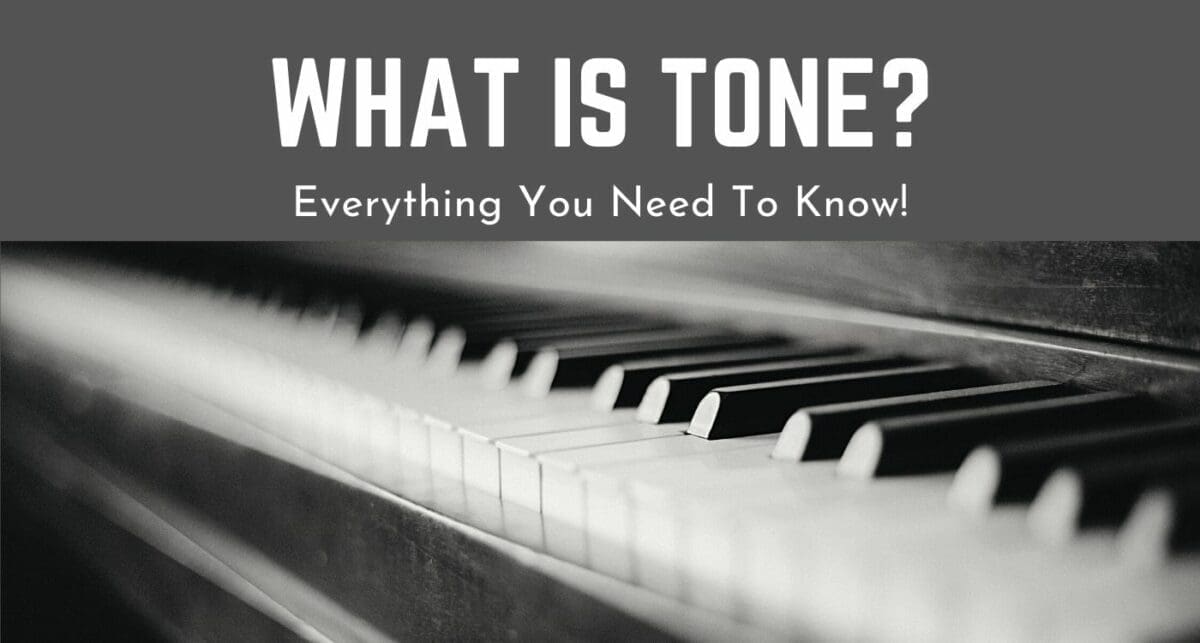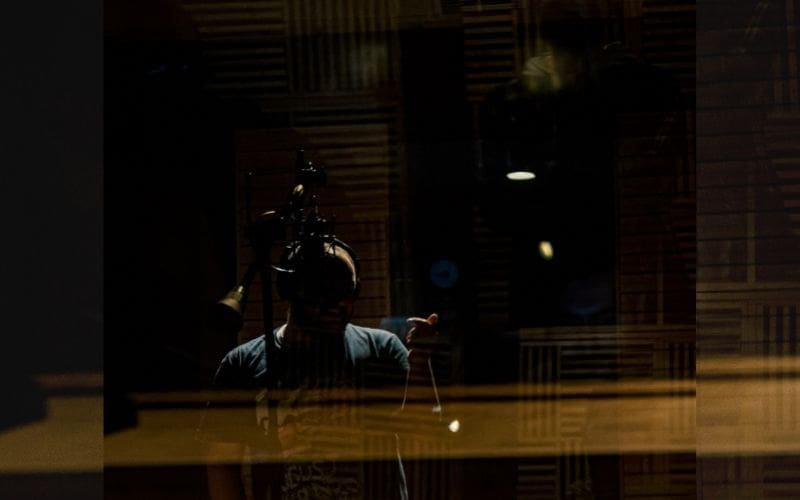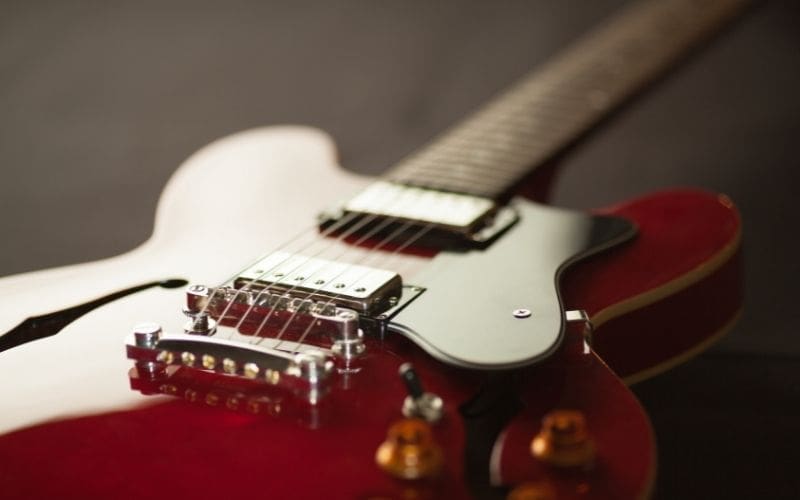Musicians are often heard to be commenting on the tone of someone’s guitar or voice, but what is it? Tone can elicit an emotional response in the listening process, and listeners either like it or don’t! There is so much more to discover about tone in music.

This piece is going to delve deeper into the concept of tone, exploring why tone is important, the various different definitions, and what contributes to tone in music.
What Is Tone In Music?

Simply put, the tone is a vocal or instrumental sound that denotes its pitch, relevant to where it is on the musical scale. Even more simply put – it’s the sound that is heard in singing or playing the notes.
When talking about tone, it is used by musicians as a description of the pitch. For example, ‘that vocal has a lovely tone’, meaning the vocalist is hitting the pitch very well and nicely. Tone can be a straightforward description and opinion. A good tone to one person may not be a good tone to someone else, which is the beautiful subjectivity of music. Something can be technically a ‘good tone’ meaning it is bang on the pitch, but it may not give the listener an aural pleasure.
Tone can also be used to describe the gap between notes on a scale. For example, the jump from C to D on the piano is known as a ‘tone’, whereas the jump from C to C sharp would be a ‘semi-tone. There are many different ways tone can be used as a descriptive word in music!
It is also worth mentioning the term ‘timbre’, which most musicians will have heard at some point. Timbre is different from tone because it is what makes a musical sound different from another, distinguishing between instruments. For example, a piano and a guitar could be playing exactly the same tonal note, but the timbre is what says whether it is a guitar or a piano. Even to the untrained ear, this would be quite obvious. It becomes less easy to tell when in the realms of stringed instruments in an orchestra or string quartet for example, but by carefully listening, most musicians can tell.
Overtones And Scales

Overtones are basically harmonics and are set at a higher frequency. Overtones and fundamental tones can often be produced in unison. This is the basis for harmonies heard in singing and on instruments such as the piano which work with multiple notes in unison. The tone is very important in the building of harmonics and harmonies. Putting together harmonious lines is a bit like building a house – the right materials that work together are needed!
When it comes to scales, there are almost too many to mention, and that is best left for another discussion! In the context of tone, it is worth mentioning Arnold Schonberg. Schonberg was a traditionalist composer who resisted tone in the 1920s and developed a 12-tone scale. The usual diatonic scale has 7 notes, with 7 modes which are different arrangements of tones. But this scale maximized 12 notes and was seen as a new way of looking at the tone. This being said, playing any instrument or singing, still uses the traditional 7-note scale!
Why Is Tone Important?

The tone in music is of great significance in all genres of music and can be illustrated in how much it is used both technically and emotionally to explain things.
To emphasize the importance of tone, it is probably good to give it some context. Take an opera: the story is building and happy – the tone of the vocal pieces and instruments would probably be in a major key, with major notes to create a positive vibe. However, if the story was reaching a sad point, the music may turn to a more minor tone. This is a classic feature of songwriting, using major and minor tones to convey positive or negative emotions and create a relevant atmosphere.
In classical music, on the written page there are often tonal instructions to tell the musician how to play the notes or the overall piece, and what kind of approach or mood is needed. A great example of this is shown in Chopin’s Nocturne.
It is also important in the context of how people see music. Even a really cheap guitar may have a lovely tone. Often when buying instruments, musicians look to the tone to distinguish whether it is good or not, and it could influence buying decisions or the kinds of instruments people like to play. Equally, it could influence us on what kind of music people like to make, whether they go for layered harmonies and melodic songs or hard and heavy rock tones!
What Contributes To Tone In Music?

Many things can contribute to tone in music, but a few of the key factors are summarised here:
Pitch Of The Note
Put simply, it’s whatever note is hit! This denotes the tone, and then it can be worked on from there. For example, a musical ear will lead musicians through scales, telling them which note sounds correct tonally, and this will also influence improvisation and general playing.
Singer’s Technique
The beauty of the human voice is that each one is different. The natural biological variance between each person and the structure of their body gives each voice its unique sound. Different techniques that singers use with the tone become something that varies with each singer! Crooner singers like Frank Sinatra and Michael Buble accentuate the booming, lower-end tones in their voice, while pop singers like Mariah Carey often sing in thinner, higher registers to suit the type of music they do.
Types Of Instruments
Different instruments have different tones. A guitar has many different tones, depending on where the strings are plucked. It will also vary whether it’s electric or acoustic, what type of wood it is made out of, and what technique is used. Less so with a piano, but the realms of keyboards can vary massively in tone. Even a violin can change tones, depending on how it is played and how it was originally constructed.
Effects
Guitar players or enthusiasts often refer to the ‘tone’ of a sound. This is often achieved through the sheer skill of playing (think Jimmy Page), or by using multiple, effects. The Edge from U2 for example uses quite minimal effects, but a heavy delay on his guitar, giving it his distinctive sound. Effects should not be overused, but they definitely have a part to play!
Ears!
People react to different tones in many ways. As previously mentioned, the tone of a singer’s voice could be pleasing to one person’s ears, and not to another. This is probably why some people love opera and some love heavy metal!
Now You Know About Tone!

Have a listen to some favourite guitar players or singers, and start to think about how the tone of their voice or their playing affects the song. There are so many ways to look at tone, but in reality, it comes down to personal preference and how to perceive it!









